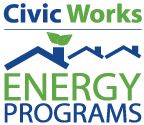- energyprograms@civicworks.com
- 410-929-6139
- Donate
- Civic Works Homepage
Frequently Asked Questions
Each solar contract comes with an operation and maintenance warranty. If there are issues with your system, please contact your solar installer for service and a professional service technician will come out and repair the system.
Solar power will not serve as a backup generator unless you have a battery system. Solar energy will go out just like other forms of energy do during a severe storm for example.
A study by the Department of Energy found that installing a solar system will add about $4 per Watt to the value of the house.
Please note though, the added value of the solar system will not impact your tax assessment.
Solar installers use flashing and are high skilled at ensuring that there are no leaks. We’ve very rarely heard of a solar installation leading to a leak. Additionally, solar companies will generally provide a 5-to-10-year warranty against leaks on the areas where the solar system penetrates the roof.
You will have to talk to your roofer about the terms of your warranty. Form our experience, the solar company is going to offer their own labor warranty, and that’s to protect you from any leaks that are caused due to the workmanship of the solar installation. Therefore, the workmanship warranty from the solar company is going to cover you for any leaks that are caused from the solar system. We have never had that happen, but it is definitely a good peace of mind to have this type of guarantee. But when it comes to the terms of your roofing contract and your roofing warranty, you must talk to your own roofer.
The solar contractor will look at all engineering issues involved with installing solar panels on the roof. The City’s permitting office requires an engineer stamp and will review the engineering analysis as part of its approval process.
It very much depends on the neighborhood, but on average, a roof assessment will disqualify 30% of homeowners in cities and will disqualify 60% in suburbs. The most common disqualifying issue (especially in suburbs) is shading from trees. Other common issues are if the roof is too small, if the roof is irregularly shaped, if there are obstructions on the roof (chimneys, etc.), and if the roof faces north (all other directions are good – south is the best).
Yeah, if you’re in need of a new roof, it’s better to combine it with getting a new solar system. The reason why you want to do that is to combine incentive of the tax break as well as with the cost of getting a new system. You can get a bigger tax break, if you combine getting your new solar systems with the new roof, as well.
Please impress on homeowners that the contractor will recommend the best optimally sized solar system, based on three factors: 1) roof size; 2) level of electricity usage; and 3) the homeowner’s budget. The size of a system will range from 3 kW to 10 kW. As a program, our current average system size is 7 kW. 3 kW is generally the minimum system size that will ensure an attractive return on investment.
10. Is there a minimum solar system size for taking advantage of the State of Maryland $1,000 grant?
No, there is no minimum system size. The only limiting factor is the minimum size of system that a contractor would be willing to install. The maximum size system for the residential grant is 20 kW.
The solar contractor takes care of all the paperwork. The permitting process can vary widely – anywhere from 2 weeks to 4 months.
In June of 2021, U.S. Customs and Border Protection issued a Withhold Release Order on silica-based products from Hoshine Silicon Industry due to forced labor concerns in China’s Xinjiang region. Separately, some U.S.-based companies have filed a petition with the Department of Commerce asking that tariffs on imported solar goods be extended to Malaysia, Vietnam, and Thailand. Despite some these challenges, fortunately, our current solar contractor is getting solar panels from South Korea. Therefore, there should not be any major delays.
Yes, you still have to go through the HOA approval process.
Yes, to store energy, you will need a battery bank.
Your warranty on your solar system will typically ensure damaged caused to the roof shingles where the racking system is holding your solar panels. Any damaged proven to be caused by the solar system’s racking system is covered by your solar system warranty.
Actually, yes! When you install solar panels, , they act as a stellar protectant for your roof, which can actually extend its life. How does this happen?
Solar panels can protect your roof from the sun’s harmful rays. The panels absorb sunlight that otherwise would be absorbed directly by your shingles, sun bleaching them and drying them out.
Additionally, air flows between the panels and the roof, cooling the roof considerably. The solar panels act like a shade tree, reducing the temperature inside the house by as much as 35 percent because the shingles aren’t absorbing the sunlight and also keeping the roof safer from falling debris.
Installing solar panels also protects your roof from inclement weather like snow, ice and hail that normally can do a great deal of damage to a roof. This protection from solar panels can help make your roof last longer as well..
Source: https://tinyurl.com/3he92shb

